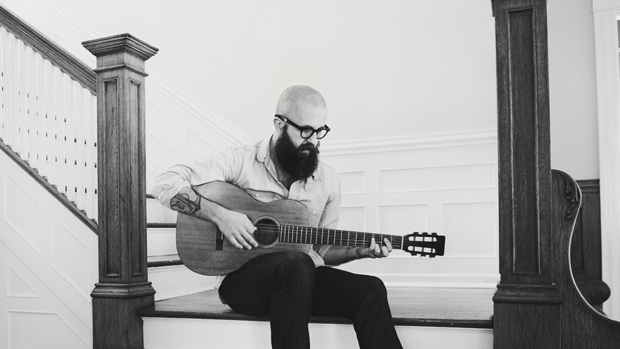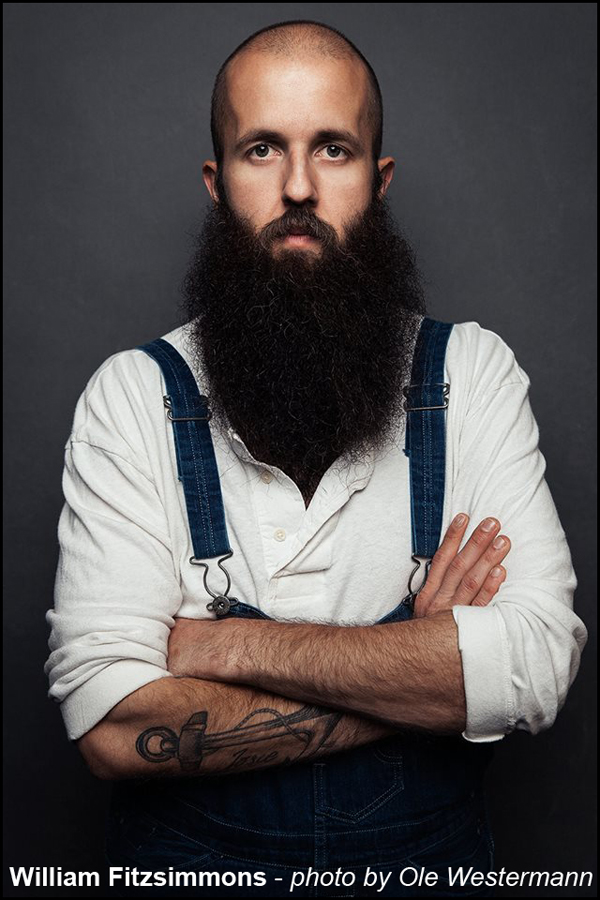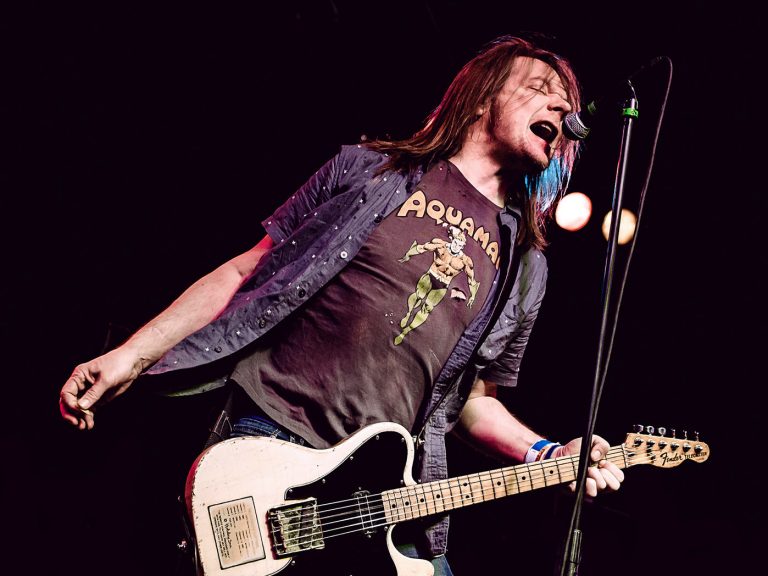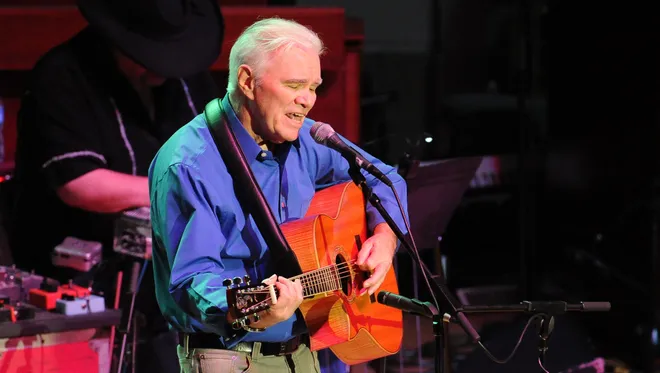
GEDSC DIGITAL CAMERA
William Fitzsimmons is a painstakingly honest man. His music is just as honest. Confronting difficult and saddening experiences ranging from divorce to death, the singer and musician, who also spent time as a therapist, is known for wearing his heart on his sleeve. But Fitzsimmons isn’t sad and actually enjoys the vulnerability that honesty brings. And every ounce of that vulnerability was needed to birth the mesmerizing, acoustic-infused folk songs that make up his repertoire of five full length albums including his latest release, Pittsburgh (May 12, 2015).
Since he will be performing in Oxford on June 10th at Proud Larry’s while on tour with Denison Witmer, I had the opportunity to chat with him about the emotional struggles of touring, in addition to everything from making an honest record and being relatable, to life as a therapist.
 Let’s talk about your latest album, Lions. After listening to all of your albums, I noticed that while there is definitely growth on this record, you didn’t try to push the envelope too far and refined your formula rather than completely changing it. The songs were kept refreshingly simple. Did it just come together like that or did you intentionally feel the need to present them that way?
Let’s talk about your latest album, Lions. After listening to all of your albums, I noticed that while there is definitely growth on this record, you didn’t try to push the envelope too far and refined your formula rather than completely changing it. The songs were kept refreshingly simple. Did it just come together like that or did you intentionally feel the need to present them that way?
What a wonderful question! One of the biggest things that I wrestle with on a day-to-day basis is the internal and external pressure to be relevant with what’s happening around [me] and still somehow hold on to whatever amount of integrity [I] have as a songwriter too. Over the last several years I’ve been more intentional on not changing. And I distinguish that from growing. Growing and changing are two separate things. Growth is figuring out how to articulate what’s inside, and changing is just purely painting a different coat on the outside of what you’re doing. So I make no qualms about not trying to be like “this is my rock record or electronic record.” I’m not changing that. And by in large what comes out ends up sounding a lot like what it would sound like ten years ago.
You have such loyal fans who truly appreciate your consistency. While watching some of your videos online, I saw countless comments about what your music means to people. How much of a role does that play when putting together an album in comparison to just expressing yourself in a way that feels right to you?
It’s such a difficult thing to do because on one side you have to pay your bills and you don’t want to intentionally make something that’s offensive or off-putting. I’ve been making music for ten years now and there are songs that people remember the lyrics that I don’t remember anymore. So [I’d] be lying if [I] said [I] didn’t think about those things and didn’t think about the people who are connecting with it. But in the same breath, the reason why those people are connecting with it is because I’ve always tried to be honest and not be too concerned with what comes out on the other end of it. So do I consider the after effect? Absolutely. I want people to be affected and even helped by this music in some way. And you referenced the comments. I come out after every single show and talk to people briefly. That’s the average comment I get is usually something to the effect of “Thank you for this song or this record, it helped me through a difficult time.” I want to honor that but yet still say whatever I feel like needs to be said. Every song, every word I write, there is a dance between those two things.
 I know you were a therapist for a little while before your music career took off and have a background in the psychology world. But even as an artist, through sharing these personal, vulnerable moments in your life you are still providing something extremely therapeutic to the listener. Do you ever feel a sense of responsibility to be that source of inspiration or therapy for your fans?
I know you were a therapist for a little while before your music career took off and have a background in the psychology world. But even as an artist, through sharing these personal, vulnerable moments in your life you are still providing something extremely therapeutic to the listener. Do you ever feel a sense of responsibility to be that source of inspiration or therapy for your fans?
Responsibility is a really good word for that. That’s the word that I like to use when I’m thinking about it. And I take that element of therapy that music can be very seriously. That’s the primary reason that I make songs, both for myself and hopefully for other people. It was super overwhelming at first, even though I was coming from a counseling background. I’ll be honest, I was used to people sharing some pretty dark things with me, about as awful as you can think of. And those were the things I would talk about from 9 to 5. So it wasn’t shocking in that sense to hear those things. But what was really jarring was these were my own stories and people were saying that they were having an effect on their own lives. Once I swallowed that though, then it became this kind of welcomed burden. I’m getting tired; I’m 37 years old, and that’s pretty young I guess, but I’m not 18. And touring can be hard; I’m away from my kids, not sleeping as well. But when you step on stage and see somebody that you can tell has been looking forward to this for a while and they want to get something out of it. You buck up pretty quickly and remember you owe people something. You owe them yourself.
As I was preparing for this interview, I watched quite a bit of your video footage and, despite what people may think, you actually have a very cheerful, even humorous disposition. Seeing that side of you actually helped me to understand your music a bit more and how a
dichotomy of emotions exists there. Do you feel like that’s accurate?
That’s exactly what it is. It’s just being an honest person. I take medications for OCD and depression and anxiety, but I’m not an actor. I was talking with my best friend who I’m on tour with right now, Denison Witmer, about the distinction between acting and performing and that we are as musicians we’re meant to perform, not act. We go up there and we should be ourselves. And I think most of the time people are surprised and sometimes maybe like you, get a better understanding of the music a little bit more. And every once in a while, I get someone who is really bummed out that I’m not like Jim Morrison, and I’m not super broody and angsty. That’s not who I am. I have a full range of emotions like most other human beings and I want people to get a sense for that. I want them to feel a bunch of different things. I’ve been to enough shows, and no criticism, but I can tell when someone is performing and when someone is acting. And I enjoy the performer much, much more.
So now, with five albums under your belt and a tour well underway, what’s in the foreseeable future for you?
I see a lot of diapers when I get back home, because my wife’s been doing all of that stuff. I hit the ten year mark this year of doing this as my occupation. And I’ve never really made much of a plan beyond what I’m inspired by at the moment and sharing that with people and moving on. But I don’t think about it too much. I don’t think planning is a bad thing. But I feel like I’m in my best creative space when I just kind of let it happen. I’m living my life, enjoying my kids and hopefully being there when I can for my family and friends. If you’re really locked into life you start to notice some really beautiful things and some ugly things and you want to explore that. So, basically, I’ve got nothing, haha. But I’m confident that I’ll be inspired by something. ![]()
–
This article was printed in The Local Voice #230 (published May 28, 2015).
To download the PDF of this issue, click here.


